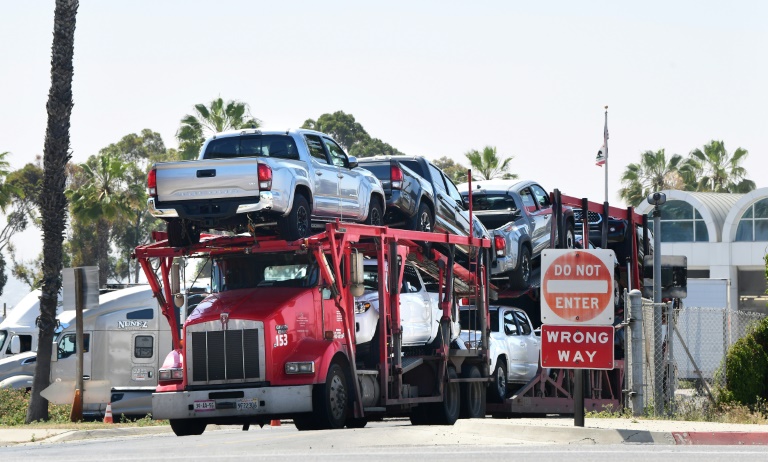
A truck loaded with vehicles enters the US at the Otay Mesa port of entry at the US-Mexico border in San Diego, California on June 8, 2019. (Photo: AFP)
Businesses and workers at the US-Mexico border in California expressed relief Saturday over the scrapping of planned tariffs which had threatened to deal a devastating blow to a region built on cross-frontier trade.
Otay Mesa, California's busiest border crossing for commercial trucks, had been braced for the worst after US President Donald Trump vowed to impose levies on Mexican imports over illegal immigration.
Senior officials announced an agreement Friday night to avert the tariffs after three days of intense negotiations -- to the delight of border workers.
"If tariffs had gone up, all the rates would go up," said Rafael Toledo, a 61-year-old towing company employee, on his commute from Mexico early Saturday.
"But I'm not worried now because everything was sorted out yesterday, no? I don't think there will be a problem now. Tariffs are bad for the US and bad for Mexico."
Daniela Clark, a Mexican housewife visiting the US, said her family's avocado export business would have been forced to hike prices if the tariffs had come in.
"They have to sell their avocados in the US and no one would have wanted to buy them," she said.
A day earlier, long lines of trucks had stretched into the distance across the border while warehouses on the US side were stuffed with goods as companies raced to shift their inventory in anticipation of the tariffs.
But it was business as usual Saturday as a steady stream of freight vehicles passed through Otay Mesa's sprawling inspection facility.
"I go across to Mexico every day. Yesterday there were a thousand trucks lined up trying to get across," said produce distributor Jorge Hernandez, 39, as his team shifted crates of watermelons.
"When the deal was announced they all disappeared."
He added: "People were rushing goods across the border. I've seen crates and crates of produce piled up, now they don't know what to do with it all."
Jesus Baracamontes, 42, a forklift driver at the border inspection facility, said goods would continue to cross regardless of tariffs, but any hike in food prices would hit his wallet.
"I don't think it would affect me for work too much. We're busy right now because it's tomato season for another week," he said.
"But as a consumer it would have been very bad. It's crazy to put extra prices on things that are already so expensive."
'Not this time'
Trump had threatened a five percent tariff on all Mexican goods coming into the United States on Monday, rising to 25 percent by October, if Mexico did not move to seriously address the northward flow of migrants from Central America.
The tariffs would have severely impacted California, which imported $44 billion in goods from Mexico in 2018 -- mainly agricultural products, transportation equipment and computer and electronic products.
Mexico is also California's top export market -- purchasing some 17 percent of all California exports -- and was expected to impose retaliatory tariffs if no deal had been struck.
Experts say such an outcome would have been detrimental to both sides, especially given that the United States is already engaged in a trade war with China that has pummeled US farmers.
Electrician Arturo Dominguez, a US citizen with family in Mexico, said Trump had created a problem for "no reason" with the threat of tariffs, which he said would hurt Americans more than Mexicans.
"He created a problem, and then he solved the problem, and his supporters are all like 'Yay'. But he created the problem in the first place," he said.
Despite the relief over the deal, the row has sowed uncertainty among border workers.
"We still know the tariffs are going to come, just not this time," said Hernandez, adding that he doubted Mexico's pledged measures to crack down on migrants crossing into the US would have effect.
"It's not going to make any difference. I see people coming over that border every night. They're not going to stop."


